- Category
- War in Ukraine
"Speaking Out Means Terrorism", or Russia’s Crackdown on Dissent
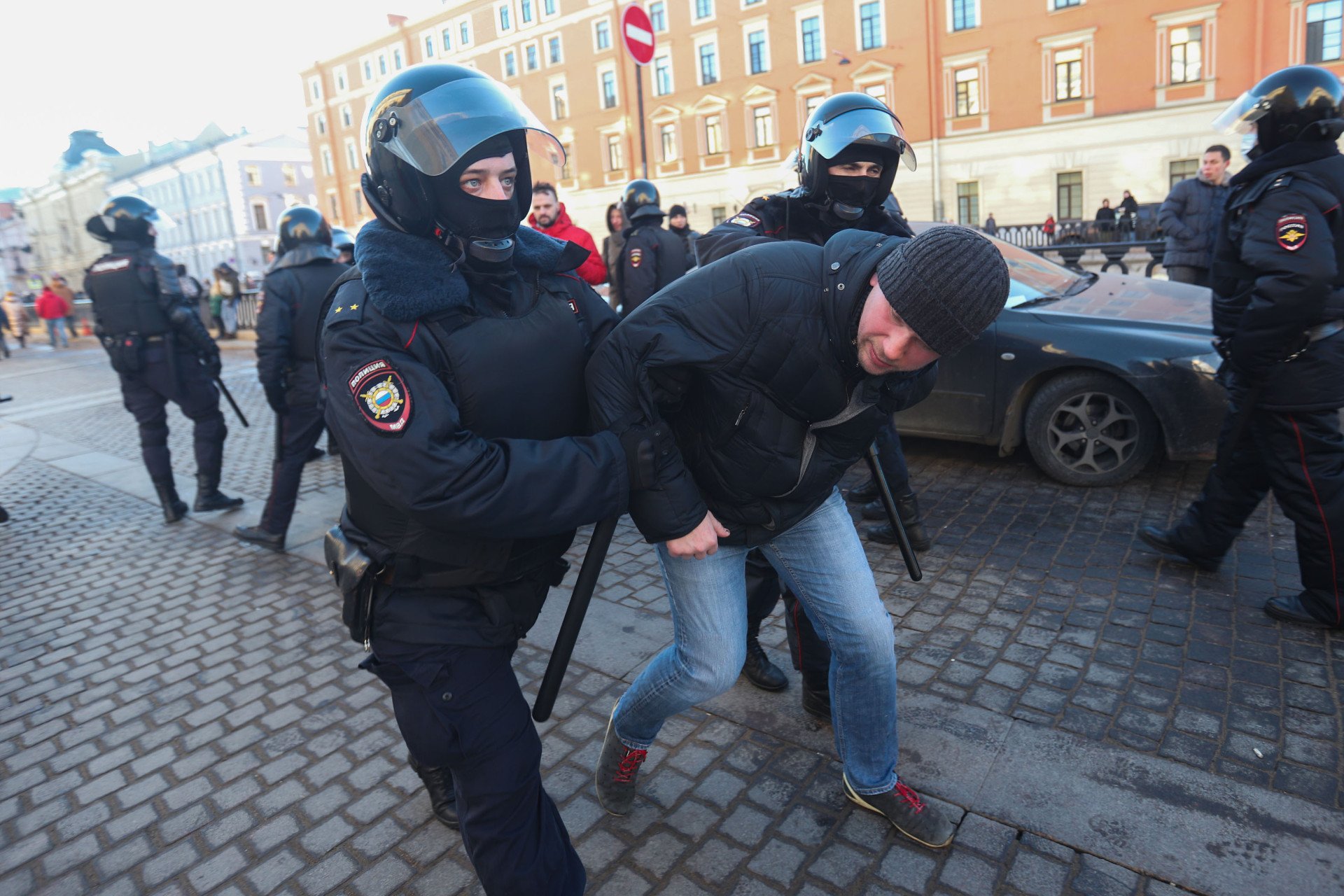
Russian authorities are weaponizing anti-terrorism laws to silence those who dare to speak out against Russia's illegal invasion of Ukraine. We look at the work of dissenters and how the Russian government abuses the criminal code to suppress opposition nationwide.
Russia continues to commit a litany of war crimes against Ukrainians, killing innocent civilians, kidnapping children, and destroying cities, homes, and villages at an unprecedented systematic, and widespread scale.
Since the full-scale invasion of Ukraine in February 2022, the Kremlin has cracked down on dissent in Russia, targeting anyone showing support for Ukraine.
During the first two years of full-scale war, from February 2022 to February 2024 there were 19,850 detentions for anti-war stances, with 15,355 of them occurring in the first month alone. The most common length of sentences passed in 2023 was four to seven years in prison, followed by sentences of seven to ten years.
In the first couple of weeks of Russia’s full-scale invasion, more than 13,000 protesters had been arbitrarily arrested for expressing their views against waging an illegal war in Ukraine. Civilians were even arrested for holding up blank pieces of paper. Most of these charges were under “disobedience” and “discrediting the use of the Armed Forces”.
In Nizhny Novgorod, Russia, a brilliant, beautiful and brave protest.
— Ben Phillips (@benphillips76) March 12, 2022
This woman holds up a *completely blank* sign, and is still taken away by police.
Shero. pic.twitter.com/Q8wh87jusC
There are currently over 1000 people accused on various charges from treason to terrorism for supporting Ukraine in some format, with almost 300 people already in pre-trial detention centers or in penal colonies.
In the first six months of 2023, Russian courts convicted 39 people of “committing or planning terrorist attacks”, more than any entire year in the last 10 years. This number has since increased.
Criminalizing dissent with terrorism and extremism charges is a tactic used by Russian authorities in order to continue their litany of war crimes, control the regime's narrative, and continue their justification for Russia’s illegal invasion.
Political censorship is a long-standing Russian tradition, but in recent years Russia's suppression of freedom of speech is more apparent. Protests have been made effectively illegal and security services respond with brutality against any form of dissent.
Now, charges of “terrorism” and “justification of terrorism” have become the go-to charge. Amnesty International calls for Russian authorities to align with international human rights standards, preventing the criminalization of peaceful dissent and protecting fundamental rights.
“A disturbing escalation in the abuse of vague anti-terrorism and anti-extremism legislation in Russia has intensified since the beginning of Russia’s full-scale invasion of Ukraine in February 2022,” said Amnesty International.
Russia’s increasing judicial force against dissent is suppressing Russians from outwardly publicizing any view against Russia’s war in Ukraine asserting further political control. Even making small donations, as little as 20 dollars to medical units in Ukraine can lead to a lengthy prison sentence.
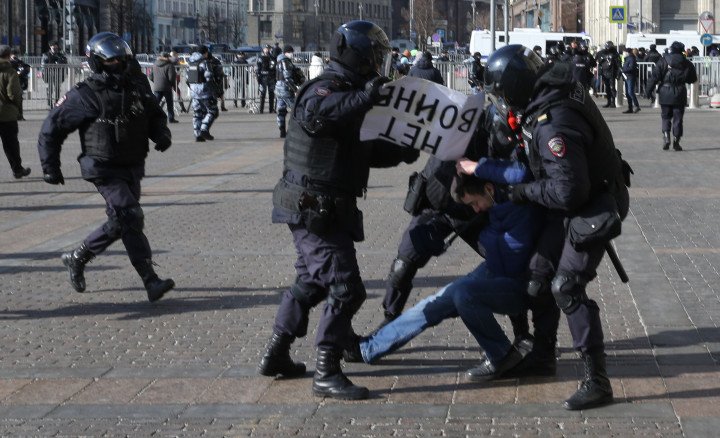
Acts of terrorism and extremism
Most of the cases in 2023 involved protests against Russia’s military mobilization to fight in Ukraine. Protesters were found throwing “Molotov cocktails” at mostly uninhabited buildings, against metal and concrete which had meager chances of setting alight and causing further damage.
The UN Special Rapporteur on counter-terrorism and human rights defined terrorism-related offenses, in which a key element must involve lethal or serious physical violence or hostage-taking.
Natalia Filonova, a Russian pensioner, was convicted after taking part in an anti-mobilization protest. In May 2024, she refused a presidential pardon because it required an admission of guilt. Russian authorities then registered her as “prone to extremism” and so she has been sent into solitary confinement without the right to family visits.
Amnesty International raised concerns about the “qualification of ‘terrorism” as some of these acts did not pose a threat of serious injury, raising concerns that Russian authorities are abusing these charges.
Mariana Katzarova, the first-ever UN special rapporteur for Russia said that “since Moscow’s unprovoked massive invasion of Ukraine, we see a situation in which all lawmaking and state activity is aimed at stifling the voices of the people, the voices of civil society, and the anti-war messages of the people.”
“I believe that the war became possible because of the enormous repressions within Russian society,” added Katzarova.
Justification of terrorism
Hundreds of people were convicted under “justification of terrorism” for discussing sympathy towards actions or people designated as terrorists, such as those charged due to throwing Molotov cocktails.
Expressions of sympathy for Ukraine or showing any support for the Ukrainian military consisting of Russian units, such as the Russian Freedom Legion, were also bound for “justification of terrorism” charges.
Aleksei Gorinov, a local councilor was sentenced to seven years in prison for criticizing the Russian government’s actions in Ukraine. While he was already in prison serving his sentence, he shared his views on the war with a cellmate and was further accused under a new terrorism-related charge.
An exiled feminist Zalina Marshenkulova, was put on the wanted list under “justification of terrorism” for social media posts on the death of anti-Ukraine military blogger Vladlen Tatarsky.
Russian dissenters
OVD-Info is an independent human rights defense and media group collecting information about all known defendants in criminal cases who are being prosecuted for anti-war stances. They work on the ground in Russia with a “global aim at putting an end to political persecution in Russia.”
Ksenia Khavana was sentenced to 12 years in a general regime penal colony on August 15, 2024, after she donated $51 to a Ukrainian charity at the start of Russia’s full-scale invasion. She had emigrated to the United States and was arrested and charged with treason when visiting her family in Russia.
Tamara Parshina was charged with treason and faces 8 years in a general regime penal colony after donating 2,500 rubles ($27) to a Ukrainian charity.
Daniil Klyuka, 27 years old, has been charged for financing terrorism and treason and has been ordered to spend 20 years in a maximum security penal colony. He’s been accused of transferring around $220 of cryptocurrency to an Azov Brigade wallet.
According to OVD-Info estimates, over 19,000 have been detained in Russia in connection with anti-war protests thus far. OVD-Info report presents a clear picture of basic freedoms that the Kremlin suppresses and notably, many of the charges are vague and unpredictable.
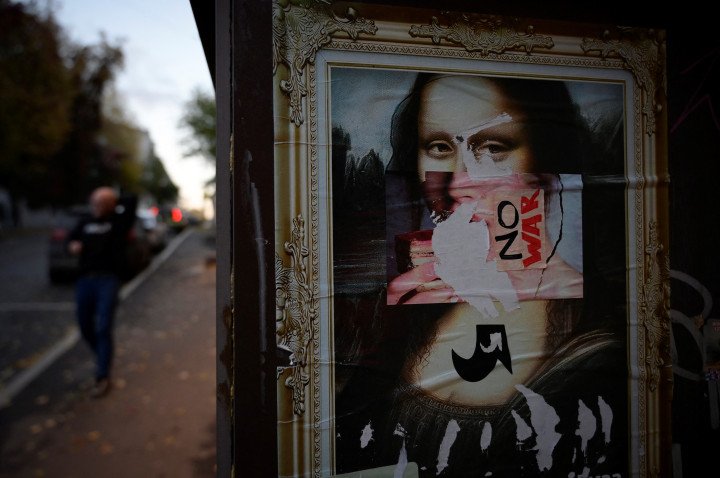
Russian law
Russian law criminalizes a broad range of actions that they consider to be terrorism-related, all of which may lead from lengthy prison sentences to life imprisonment.
Since February 2023, 24 repressive laws have been introduced by the State Duma, largely tightening already existing practices. One example is a law that introduced life sentences under the article on treason.
At the beginning of 2024, a law on the confiscation of property was adopted, which applies as a result of committing “military fakes” which includes recognizing the massacre of civilians in Bucha.
Under international human rights law, as well as Russia’s Constitution, everyone has the right to hold opinions without interference and to peacefully exercise their freedom of expression, including seeking, receiving, and imparting information and ideas of all kinds.
When being charged with terrorism in Russia, rules within the courts change, and safeguarding for court processes is effectively either removed or drastically reduced.
All cases are to be tried in military courts, often closed to the public and lawyers are often prohibited to disclose any details or accusations of evidence, which Amnesty International says ‘ increases the scope for procedural and other abuses in the courtroom’. According to them, no one accused of terrorism or related crimes has been acquitted in Russia since statistics became available in 2015.
Imprisoned anti-war critics, dissenters, and their families are being further punished by restricting phone calls and visits from family and friends. In some instances, family members are being declared as “witnesses” in the accused trial proceedings, precluding them from having any contact.
In some cases, the prisoner would have a sudden unannounced transfer on the day of the visit, and others may have their mail delayed or even banned completely. Many may not have contact with their family for months, even years.
This not only punishes the dissenters but further punishes their families too. Putting pressure on those who wish to speak out inflicting suffering and punishment on their loved ones is a tool also used in North Korea, albeit more aggressive.
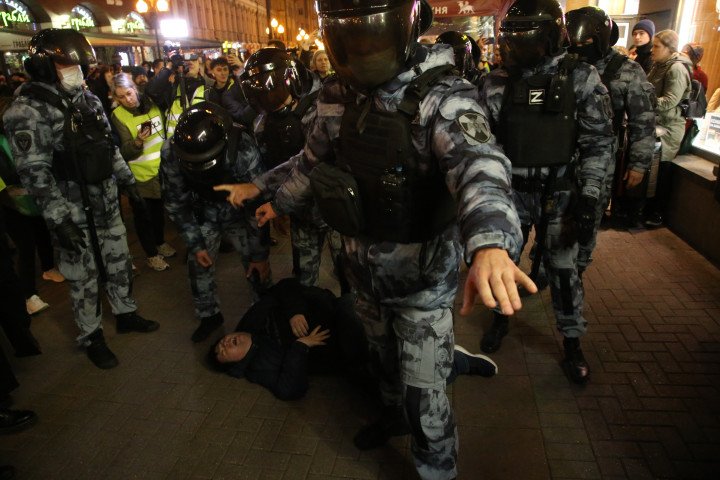
Russia’s crackdown on dissent, targeting children
Russian authorities, in their crackdown on dissent, particularly those opposing Russia’s invasion of Ukraine, not only silence and imprison adults but target children as well.
The report “Your children will go to an orphanage”: Children and the crackdown on protest by Amnesty International found that Russia is denying children's right to freedom of expression. Children are being instrumentalized to put pressure on adults opposed to war, in particular by separating families, threatening to remove parental rights, and even placing children in institutions.
In February 2023, 16-year-old school student Yegor Balazeykin threw a bottle of diesel fuel at a closed metal door of the military conscription center of Kirovsk, northwestern Russia. It caused no damage and the bottle did not catch fire. Security guards called the police who then interrogated him without his parents present. They did not inform him of his rights and he signed a self-incriminating statement.
A few days before he had allegedly thrown a bottle of white spirit at a conscription center in St. Petersburg, which also did not cause fire.
He was charged on two counts of attempted terrorist attacks and was sentenced to six years imprisonment. In April 2024, his appeal was rejected.
While there is no internationally accepted definition of terrorism, the actions of Balazerykin fall outside the model definition provided for by the UN Special Rapporteur on counter-terrorism and human rights. His actions did not involve lethal or serious physical violence nor hostage-taking.
For years, Russian authorities have been restricting children's rights to access to information, while at the same time, indoctrinating students with ideology. In September 2022, lessons called “important conversations" were added to a school program that focuses on the justification of the Russian invasion of Ukraine.
The Russian Constitution “guaranteed” the rights to freedom of thought, speech, and information. Mandating the state to protect the family and children, confirming that the upbringing of children is both a right and an obligation of parents.
In 2020, amendments were made to the Constitution which included obligations of the state to create conditions beneficial to children’s development while ensuring an in-family upbringing.
At the same time, the amended wording also included “nurturing patriotism” among children as the state’s priority, which has served to justify the indoctrination of children in schools. It fails to recognize a child’s right to freedom of expression.
Wake Up Russia
A telegram channel “Wake Up Russia” compiles photos of small anti-war messages appearing on the streets of Russia. They describe themselves as Russian citizens who are “trying to awaken others”.
A mock postage stamp featuring soldiers and written; “Yesterday's idiot, today a killer, tomorrow a corpse”
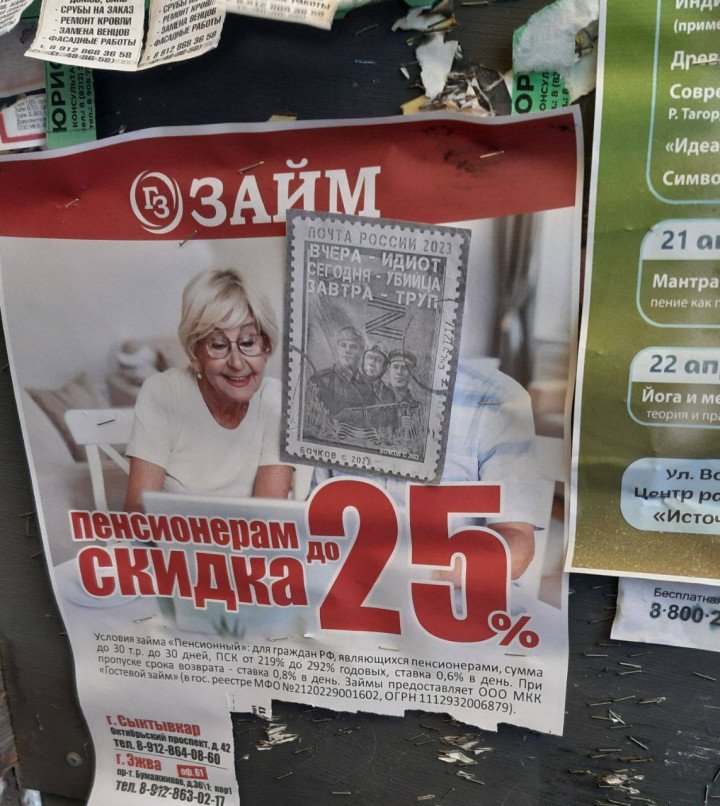
Activist channels like “Wake Up Russia” have been used to continue the sharing of information about Russian war crimes along with sharing common views of dissent among the Russian community.
Recently, however, social media formats such as Telegram, WhatsApp, YouTube, etc, where these messages and truths about the war crimes committed by the Russian regime are readily available, have had their services go down.
Activists believe this to be the work of the Kremlin. Social media services have been restricted in the past during protests or during times of unrest in Russia. They believe that now this is happening on a national level, to repress dissent.
Between 2022 and 2023, 84 cases included Telegram where Russian Forces say illegal action took place. A total of 186 involved the use of Vkontakte, a Russian social media channel.
Telegram experienced problems in Russia, Kazakhstan, and Uzbekistan and users in Moscow were only able to access the app through a VPN, while WhatsApp was only affected in Russia.
By restricting social media channels, the Kremlin continues to spread propaganda into the community, with little access to information to combat it. Propaganda is one of the most well-known tools in their crackdown on dissent. In the public space, especially within the older community, largely, there will be support for the Russian regime as they rely on and absorb state news sources only.
While some do not fear criminal reprisal and continue to speak out against Russia’s war in Ukraine, the number is small and it is not enough to shift society's general mentality. Since Russian authorities swept the streets of Russia during protests in 2022, there have been no large protests in the country, proving that their criminal crackdown is working.
The regime's restrictions on access to those charged with terrorism and restrictions on social media platforms make these stories harder to share. Human rights organizations in Russia continue to fight for freedom of speech, and it's vital that dissenters continue to voice the truth of Russia’s illegal invasion of Ukraine. Dissenters who do speak out should be supported so that the Kremlin isn’t successful in completely silencing the fighters for peace in Russia.
-46f6afa2f66d31ff3df8ea1a8f5524ec.jpg)
-35249c104385ca158fb62273fbd31476.jpg)


-554f0711f15a880af68b2550a739eee4.jpg)



-206008aed5f329e86c52788e3e423f23.jpg)